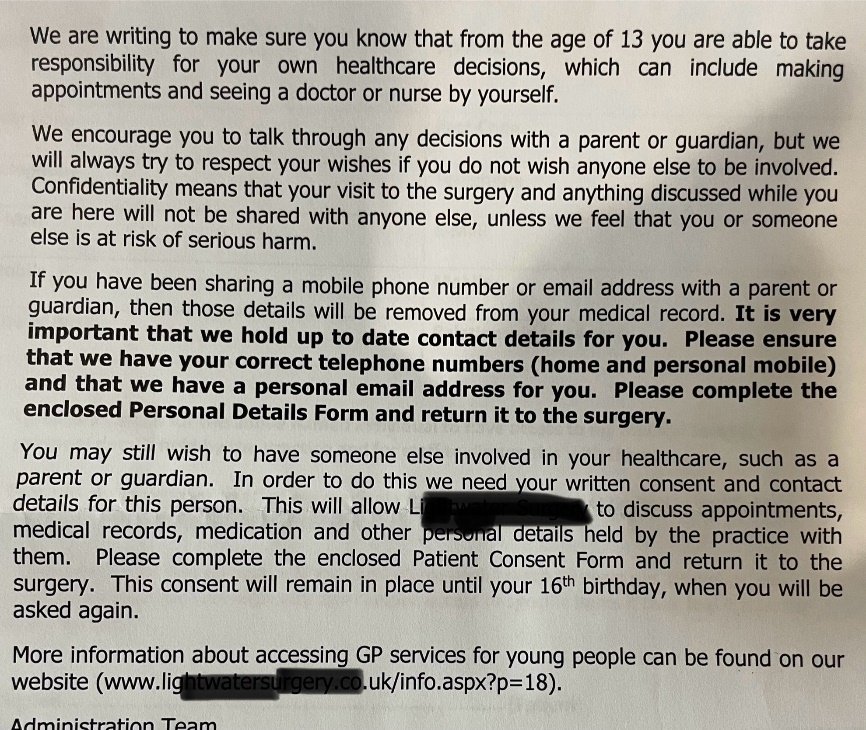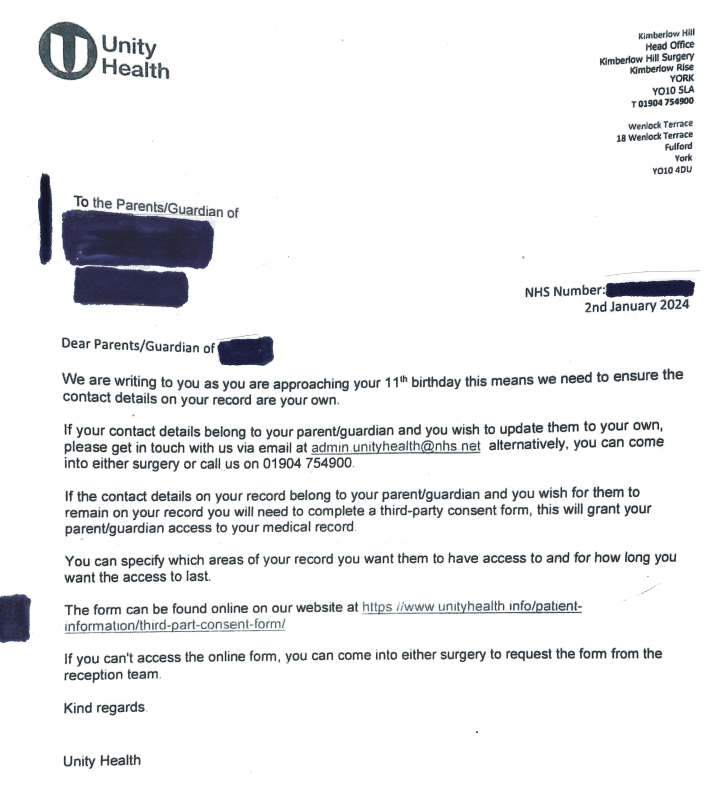THE first part of this series addressed the increased medicalisation of schools and the push from public health bodies, which are aligned with the pharmaceutical industry, to use schools as vaccination venues and to teach vaccine science and ideology. However, it appears that children are facing medical interventions and indoctrination not just in schools. At the UK Medical Freedom Alliance we were shocked to learn recently of letters being sent by the NHS directly to children at their homes, such as this letter sent to those about to turn 13, informing them that they can now make their own health decisions including making appointments and seeing a doctor or nurse alone.

Alarmingly, this letter stated that the child’s wish for confidentiality would always be respected ‘unless there is risk of serious harm’ and that the parent’s contact details would be removed from the child’s records, asking the child to fill in and return an enclosed form with their own phone and email address.If the child wishes to have a parent or guardian involved in their care, they are required to give their written consent in advance.
We have several serious safeguarding concerns about this letter:
1. It is unacceptable to attempt to bypass and exclude parents from their child’s health decisions. Nearly all parents expect to be fully involved in their child’s medical choices and the vast majority of children under 16 do not have the skills and knowledge to make complex medical decisions alone without parental support and input. As is true for adults, children with health issues will fare better with support.
2. Most under-16s lack the organisational skills to make medical appointments and rely on their parents to do this for them; most are at school during the working day and would struggle to telephone to make or receive an appointment, for example. We are concerned that neglect or delayed presentation will result if the parent is effectively excluded from being able to access medical care on behalf of their child.
3. It is concerning that the mechanism for a child to consent to parental involvement is ‘opt in’ rather than ‘opt out’. It is highly likely that most children will fail to take action on this, and parents could find themselves unable to access care on behalf of their child at a time when the child is acutely unwell or emotionally vulnerable.
4. The most vulnerable children, such as those with chronic illness, mental health problems, learning difficulties or from dysfunctional backgrounds, may be unable to access care at all if parental involvement is removed. In addition, the burden of responsibility of making their own health decisions in secrecy and unsupported by loving parents may cause unnecessary stress and anxiety for all children.
5. Full parental involvement is the norm for consultations involving children and young people and must remain so. Medical professionals have a duty in law and professional codes of practice to uphold fundamental ethical principles such as informed consent. Most children under 16 require the help of their parents fully to understand the complexity and wider implications of medical decisions.
It appears that the NHS is misusing or misunderstanding the concept of ‘Gillick Competence’ in pursuing this policy. Gillick Competence is the understanding that children under 16 can (in certain circumstances) make their own medical decisions. This was ruled by the Supreme Court in Gillick v West Norfolk and Wisbech Area Health Authority [1985] UKHL 7, a case that sought authorisation for a doctor to prescribe the contraceptive pill to a sexually active minor without parental knowledge or involvement. Gillick was never intended for the blanket removal of parental involvement in healthcare for under 16s and is only applicable in exceptional cases.
The judgement is clear that deciding competence for under-16s is decision-specific, child-specific, made with the specific factual context in mind and based on the available evidence. It can be determined only by a medical practitioner who knows the child, who must ensure and document that the child has enough intelligence, competence and understanding fully to appreciate what is involved in their treatment. The judgement stated:
‘No reasonable person could read it as meaning that the doctor’s discretion could ordinarily override parental right. Illustrations are given in the text of exceptional cases in which the doctor may take the “most unusual” course of not consulting the parent. Only in exceptional cases does the guidance contemplate him exercising his clinical judgment without the parent’s knowledge and consent.’ (per Lord Scarman at paragraph 181)
The worst example of NHS overreach we have seen was this letter, sent by a GP practice for the attention of a ten-year-old child and shared with us by their concerned parent.

Unbelievably, the child was informed that as he/she is now approaching their 11th birthday, the practice must ensure that contact details on their medical record are the child’s own.In the letter, the child is instructed to email or call the practice, or even go into the surgery, to give their personal contact details, and that if the child wishes to keep their parents’ contact details on their record, they must fill in a third-party consent form to grant his/her parent access to their medical record!
It is self-evidently completely inappropriate and unacceptable for adults to contact other people’s children in this way, especially at the age of ten, or to involve them in adult processes and decisions in a completely age-inappropriate way. No child should be subjected to direct approaches from a GP practice regarding their medical care. To suggest that a child of ten shares their personal contact details, or travels (alone?) to the practice to fill in forms that they are unlikely fully to comprehend, is surely a child protection issue. The lack of scrutiny and secrecy of the resulting communications would be a red flag in all other interactions between a child and unrelated adult in society, and is by its nature coercive due to the extreme imbalance of power and knowledge.
We have contacted Unity Health directly, in the form of an open letter to their managing partner, Mrs Louise Johnston, which we have published on our website. We have asked her to respond as a matter of urgency to the safeguarding concerns we have raised and will publish any response that is forthcoming.
We would be interested to hear from parents to see how widespread this phenomenon is, as it is unclear whether this is confined to a few rogue GP practices and NHS Trusts or is a more established national NHS policy. Please send any similar correspondence to enquiries@ukmedfreedom.org, with all personal details redacted. This behaviour constitutes a direct attack by the state (through the NHS) on the family, threatening the right of parents to be involved in or make healthcare decisions for their own children, knowing their best interests. Parents must push back against this gross state overreach and protect their children from the nanny state.











